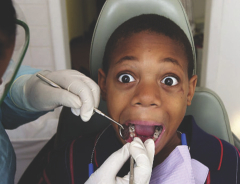 (NAPSI)—While going to the dentist is vital because oral health affects overall health, parents should be aware of specific precautions to take to protect their children during visits to the dentist and orthodontist.
(NAPSI)—While going to the dentist is vital because oral health affects overall health, parents should be aware of specific precautions to take to protect their children during visits to the dentist and orthodontist.
There are a number of infection control measures that should be standard in every office for every patient:
• Dental and orthodontic professionals should wash their hands and put on fresh gloves and a new mask before beginning work in the mouth.
• All single-use items should be disposed of. If offices reuse these items, they risk the possibility of spreading disease.
• After every patient, the treatment area and all equipment should be cleaned and disinfected with a hospital-grade disinfectant, not just household cleaner. Plastic barriers should cover as much equipment as possible.
There is equipment customized for kids that can create a safe and comfortable environment for junior patients. “One key to encouraging children’s participation at dental and orthodontic checkups is to make the experience more pleasant and less scary,” says Noel Brandon-Kelsch, a registered dental hygienist and the infection control columnist for RDH magazine. She suggests parents make a few simple requests of their dental and orthodontic professional:
• Request a disposable bib clip for your child. Metal bib clips are cold on the neck and can harbor bacteria. Researchers at Tufts University School of Dental Medicine and the Forsyth Institute found that 20 to 30 percent of bib clips still had bacteria on them even after being disinfected. The same study found that bib clips from orthodontic offices had 1½ to two times as many bacteria on them as clips from an endodontic dental clinic before disinfection. The researchers speculated that young patients might be more prone than older ones to touch the bib clip during treatment. A disposable bib clip is guaranteed to be bacteria-free.
• It’s imperative to make sure your child receives an X-ray apron with a built-in thyroid guard to use during X-rays. Although there is no specific research indicating a correlation between thyroid cancer and dental and orthodontic X-rays, according to the American Cancer Society, people who receive head or neck radiation treatments in childhood are at increased risk for thyroid cancer. Built-in thyroid collars are required to shield the thyroid from unnecessary radiation during X-rays of the mouth. Recent innovations in the design of X-ray aprons have also made them lead-free, and thus 30 percent lighter than leaded aprons while offering the same level of protection. Brandon-Kelsch adds, “Parents should request a kid-sized X-ray apron that covers small bodies appropriately. The apron should be clean and not have any tears or creases that would compromise the protective layer of the apron.”



